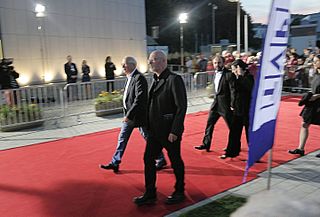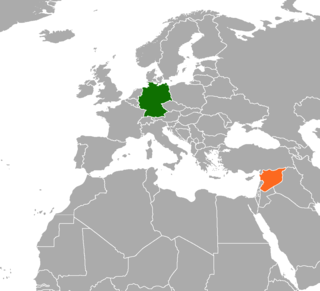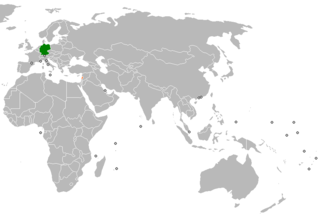
This is a demography of the population of Lebanon including population density, education level, health of the populace, economic status, religious affiliations and other aspects of the population.

Syria's estimated pre–Syrian Civil War 2011 population was 22 ±.5 million permanent inhabitants, which included 21,124,000 Syrians, as well as 1.3 million Iraqi refugees and over 500,000 Palestinian refugees. The war makes an accurate count of the Syrian population difficult, as the numbers of Syrian refugees, internally displaced Syrians and casualty numbers are in flux. The CIA World Factbook showed an estimated 20.4m people as of July 2021. Of the pre-war population, six million are refugees outside the country, seven million are internally displaced, three million live in rebel-held territory, and two million live in the Kurdish-ruled Autonomous Administration of North and East Syria.

Erika Steinbach is a German right-wing politician. She previously served as a member of the Bundestag from 1990 until 2017.

Immigration to Germany, both in the country's modern borders and the many political entities that preceded it, has occurred throughout the country's history. Today, Germany is one of the most popular destinations for immigrants in the world, with well over 1 million people moving there each year since 2013. As of 2019, around 13.7 million people living in Germany, or about 17% of the population, are first-generation immigrants.

Kniefall von Warschau, also referred to as Warschauer Kniefall, refers to West German Chancellor Willy Brandt's gesture of genuflection before a memorial to the Warsaw Ghetto Uprising during a state visit to Poland in 1970. Perceived as a sign of profound humility, images of Brandt's action received world-wide attention. More broadly, the gesture came to symbolise Ostpolitik, Brandt's ultimately successful policy of diplomatically reconciling West Germany with its eastern neighbours following the Holocaust and the Second World War.

Gerhard "Gerd" Müller is a German politician of the Christian Social Union in Bavaria, who is currently serving as Director General of the United Nations Industrial Development Organization since 2021.

The Qatar Red Crescent Society, the Qatari branch of the Red Crescent Society, was established in 1978. In 1981, it gained international recognition from the International Committee of the Red Cross in Geneva and joined the International Federation of Red Cross and Red Crescent Societies (IFRC). It is also a member of the Secretariat of Arab Red Crescent Societies in Jeddah. It became the first philanthropic organization in Qatar to establish a women's branch in 1982.
Refugees of the Syrian civil war are citizens and permanent residents of Syria who have fled the country in the course of the Syrian civil war. The pre-war population of the Syrian Arab Republic was estimated at 22 million (2017), including permanent residents. Of that number, the United Nations (UN) identified 13.5 million (2016) as displaced persons in need of humanitarian assistance. Since the start of the Syrian civil war in 2011 more than six million (2016) were internally displaced, and around five million (2016) crossed into other countries, seeking asylum or placement in Syrian refugee camps. It is believed to be one of the world's largest refugee crises.
Ania Bien is an American photographer. Born in Kraków, Poland, to Polish-Jewish parents, she moved to the United States in 1958, where she studied painting and cultural anthropology. Since 1973 she has lived in Amsterdam.

Humanitarian aid during the Syrian civil war has been provided by various international bodies, organizations and states. The main effort is coordinated by Jonh Ging of the United Nations Office for the Coordination of Humanitarian Affairs (UNOCHA). In 2014, U.N. Security Council Resolution 2165 authorised humanitarian aid to be supplied via four border crossings not controlled by the Syrian government, generally to supply rebel-controlled territory.
Syrians in Lebanon refers to the Syrian migrant workers and, more recently, to the Syrian refugees who fled to Lebanon during the Syrian Civil War. The relationship between Lebanon and Syria includes Maronite-requested aid during Lebanon's Civil War which led to a 29-year occupation of Lebanon by Syria ending in 2005. Following the outbreak of the Syrian Civil War, refugees began entering Lebanon in 2011.

The 2015 European migrant crisis was a period of significantly increased movement of refugees and migrants into Europe, namely from the Middle East. An estimated 1.3 million people came to the continent to request asylum, the most in a single year since World War II. They were mostly Syrians, but also included a significant number of people from Afghanistan, Pakistan, Iraq, Nigeria, Eritrea, and the Balkans. The increase in asylum seekers has been attributed to factors such as the escalation of various wars in the Middle East and ISIL's territorial and military dominance in the region due to the Arab Winter, as well as Lebanon, Jordan, and Egypt ceasing to accept Syrian asylum seekers.
Hatune Dogan is a religious nun of the Syriac Orthodox Church of Antioch, President of the organization Helfende Hände für die Armen. She currently lives in the Syriac Orthodox monastery of St. Jacques Sarug in Warburg, Germany.

This is a timeline of the European migrant crisis of 2015 and 2016.

Miriam Shaded is a Polish entrepreneur, human-rights activist and critic of Islam. She is the founder and president of the Estera Foundation tasked with bringing Christian refugees from Syria to Poland.

Volhynia or Hatred is a 2016 Polish war drama directed by Wojciech Smarzowski. The film is set in the 1939–1943 time frame and its central theme is Ukrainian anti-Polish hatred culminating in massacres of Poles in Volhynia. The screenplay was based on the collection of short stories titled Hate by Stanisław Srokowski.
Islamophobia in Poland is the fear, hatred of, or prejudice against the Islamic religion or Muslims in Poland. Since the Muslim community in Poland is small the situation has been described as "Islamophobia without Muslims". According to Monika Bobako, Islamophobia is one of the main elements of the Polish nationalist discourse. Islamophobia in Poland takes the form of xenophobia and discrimination towards Muslims or those perceived as Muslim.
The city of Baltimore, Maryland includes a small Syrian population. The Syrian-American community is centered in East Baltimore. While Syrian-Americans have had a presence in Baltimore for over a century, most Syrians in Baltimore are recent immigrants and refugees who have fled the Syrian Civil War.

Germany–Syria relations are the bilateral relations between Germany and Syria. Germany closed its Damascus embassy and stopped its recognition of Bashar Al-Assad in 2012 because of the Syrian civil war, but has never completely cut relations with the Syrian government.

Germany–Lebanon relations are "traditionally friendly" and "very close", according to the German Foreign Office. For Lebanon, Germany is one of the most important donor countries for the care of the numerous refugees in the country. Among the Arabs in Germany, the Lebanese are among the largest groups with almost 160,000 members (2021).













